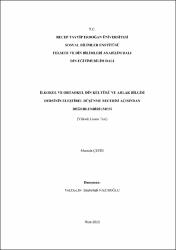| dc.description.abstract | Bu araştırmada eleştirel düşünme kavramı incelenmiş ve eleştirel düşünmenin ilkokul ve ortaokul Din Kültürü ve Ahlak Bilgisi dersindeki yeri saptanmaya çalışılmıştır. Araştırma çerçevesinde mevcut İlköğretim DKAB Dersi Programı?ndaki eleştirel düşünmeye yapılan vurgular ortaya konmuş ve Milli Eğitim Bakanlığı tarafından hazırlatılmış olan İlköğretim DKAB öğretmen kılavuz kitaplarının ilköğretim öğrencilerinin eleştirel düşünme becerilerini geliştirmeye uygun olup olmadığı incelenmiştir. Çalışma, iki ana bölümden oluşmaktadır: Birinci bölümde düşünme ve süreçleri hakkında bilgi verilmiş, düşünmenin türleri, öğeleri ve düşünme becerileri açıklanmış ve İslâm dininin düşünmeye verdiği önem belirlenmeye çalışılmıştır. Bu bölümde sonraki bölümlere temel teşkil etmesi amacıyla eleştirel düşünmeyle ilgili temel bilgilere yer verilmiş, eleştirel düşünme kavramı irdelenerek eleştirel düşünme eğitimi konusuna değinilmiş, İslâm?da düşünmenin ve eleştirel düşüncenin yeri, din eğitiminde eleştirel düşünme ve din eğitiminde eleştirel düşünme etkinlikleri hakkında teorik bilgi verilmiştir. İkinci bölümde, İlköğretim DKAB dersi programında eleştirel düşünmeye verilen önemi tespit etmek amacıyla programda eleştirel düşünmeye yapılan vurgular ortaya konmuş, öğretmen kılavuz kitabının işleniş basamağı ve ölçme-değerlendirme bölümlerindeki eleştirel düşünmeyi geliştirici yöntem ve teknikler, etkinlikler ve sorular incelenerek kitapların eleştirel düşünme öğretimine uygunluğu araştırılmıştır. Sonuç ve değerlendirme kısmında ise, mevcut durumu iyileştirmek için yapılabilecekler tartışılmış ve önerilerde bulunulmuştur. Araştırma sonucunda İlköğretim DKAB öğretim programının pek çok yerinde eleştirel düşünmeye vurgu yapıldığı ancak eleştirel düşünmenin içeriği hakında bilgi verilmediği belirlenmiş, öğretmen kılavuz kitaplarındaki ders işleme stratejileri, sorular ve etkinliklerin birçoğunun eleştirel düşünme açısından anlamlı olmakla birlikte yeterli olmadığı ve geliştirilmesi gerektiği ortaya çıkmıştır. Anahtar Kelimeler: Eleştirel düşünme, din eğitimi, düşünme becerileri, düşünme becerileri eğitimi, düşünme eğitimi, düşünme öğretimi, İlkokul ve Ortaokul Din Kültürü ve Ahlak Bilgisi, öğretim programı. In this study, the concept of critical thinking is elaborated and the position of critical thinking within the Primary and Secondary School Culture of Religion and Ethics Knowledge Course is tried to determine. Within the frame of this study, emphases given to the critical thinking in the teaching program of Culture of Religion and Ethics Knowledge are presented, and appropriateness of Culture of Religion and Ethics Knowledge guide book prepared by the Ministry of National Education for developing skills of critical thinking of primary school students is investigated. This study consists of two main chapters: In the first chapter information about thinking and its processes is given, types, elements and skills of thinking are explained, and the importance given to thinking in Islam is tried to determine. In this chapter, basics of critical thinking is explained to guide the following chapters of the study, critical thinking and teaching of critical thinking are elaborated, and theoretical information about the place of thinking and critical thinking in Islam, critical thinking in religious education and activities of critical thinking in religious education are given. In the second chapter, emphases given to the critical thinking in the teaching program of Culture of Religion and Ethics Knowledge are presented to determine the importance given to critical thinking in the teaching program, appropriateness of the guidebooks of this course for teaching the critical thinking by analyzing the methods, technics, questions and activities in the teaching and assessment-evaluation sections of the book is researched. In the conclusion section, discussions and suggestions for revamping the existing situation of the curriculum and about what has to be done are given. According to the findings of this study, it is determined that even though the emphases on critical thinking in Culture of Religion and Ethics Knowledge are given many times, there is no knowledge about the content of critical thinking, and even though many of the teaching strategies, questions and activities in the book are of great significance to critical thinking, these are not enough and need further development. Keywords: Critical thinking, religious education, thinking skills, thinking skills teaching, Primary and Secondary School Culture of Religion and Ethics Knowledge, teaching program, curriculum. | en_US |


















